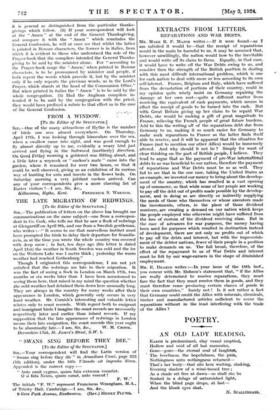EXTRACTS FROM LETTERS.
REPARATIONS AND WAR DEBTS.
MR. MARK B. F. MAJOR writes :—If it were found—as I am satisfied it would be—that the receipt of reparations would in the main be harmful to us, it may be assumed that, however unwillingly, the nation would bow to the inevitable and would write off its claim to them. Equally, in that case, it would have to write off the War Debts owing to us, and consider then the strength of the British position in dealing with this most difficult international problem, which is one for each nation to deal with more or less according to its own self-interest. France, Belgium and Italy, which have suffered from the devastation of portions of their country, could in my opinion quite wisely insist on Germany repairing the damage at her own cost—quite a different matter from receiving the equivalent of cash payments, which means in effect the receipt of goods to be turned into the cash. But with Great Britain giving up her claim to be repaid War Debts, she would be making a gift of great magnitude to France, relieving the French people of great future burdens. Add to this the writing off of the reparations debt due from Germany to us, making it so much easier for Germany to make such reparations to France as the latter finds itself able to receive, and it will be apparent that the situation for France (not to mention our other Allies) would be immensely altered. And why should it not be ? Simply for want of clear thinking on the part of British people, I believe. They tend to argue that as the payment of pre-War international debts to us was beneficial to our nation, therefore the payment of reparations and War Debts must be so as well. They fail to see that in the one case, taking the United States as an example, we invested our money to bring about the develop- ment of the country, -which has resulted in a vast opening up of commerce, so that while some of her people are working to pay off the debt out of profits made possible by the develop- ment, and in doing so are directly or indirectly supplying the needs of those who themselves or whose ancestors made the investments, others, in the place of those dividend receivers, are creating a demand on our nation which keeps the people employed who otherwise might have suffered from the loss of custom of the dividend receiving class. But in the case of advances for war purposes, the money having been used for purposes which resulted in destruction instead of development, there are not only no profits out of which to pay off the debts and interest, but with the impoverish- ment of the debtor nations, fewer of their people in a position to make demands on us. The full brunt, therefore, of the effect of the repayment to us of War Debts and interest must be felt by our wage-earners in the shape of diminished employment.
MR. E. DEAKIN writes :—In your issue of the 19th inst., you concur with Mr. Hobson's statement that, " if the Allies are really determined to receive reparations, they must face the fact that they must receive them in goods, and they must therefore cease producing certain classes of goods in their own countries." Surely not ! Is it not rather a fact that Germany could credit the Allies with minerals, chemicals, timber and manufactured articles sufficient to cover the reparations without in the least interfering with the trade of the Allies ?














































 Previous page
Previous page